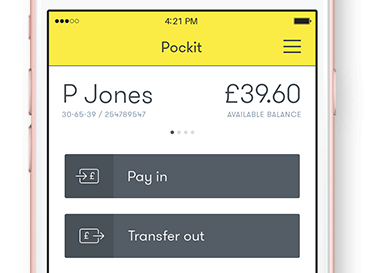Growth Business caught up with Virraj Jatania, CEO of Pockit, the world’s first 99p bank service for a global market of around 4 billion people
Name: Virraj Jatania
Company: Pockit
Location: London
Date launched: September 2014
Number of employees: 22
What does your business do?
Pockit is a no-nonsense banking service for unbanked and underserved customers. We have 28,000 locations where our customers can deposit cash, whether its their salaries or government benefits, using Mastercard to access their money.
A lot of our customers are in the lower income segment, and Pockit focuses on financial inclusion so they can move away from paper money.
Where did the idea for your business come from?
There were three things happening in the market that inspired me to set up Pockit.
Firstly, the disruption of financial services was starting to gain momentum. Thinking back to 2014, London was very different back then from a FinTech perspective. The revolution was just starting with the Wongas, Zopas, and Funding Circles.
Secondly, e-commerce trends were beginning to emerge. More and more core purchases were happening online than ever before. People were starting to buy all sorts of products and services they would normally buy on the high street online. This has continued every year and has grown exponentially.
The third element is due to my exposure to my family business, which operated in emerging markets such as Nigeria, India, Russia and the Middle East. Having lived in these countries while growing up, I noticed how everything was cash based. If you had a factory of 2000 employees and payed them all in cash, it’s terrible for your business, and for your employees. It’s not easy to budget or share cash with family and friends with cash alone, and most importantly, you cant use cash online.
That made me think how to provide a way for cash-based consumers to use cash online.
How did you know there was a market for it?
Around 4 billion people fall in this bracket around the world. Depending on which report you look at, 3 to 4 million people in the UK don’t have access to basic banking facilities, 4 million are underserved. A market of 8 million in the UK alone is a pretty big problem.
We got up and running in beta in late 2013 and came through to early stages in 2014. I realised that if we’re really going to run in this space, we need to own as much of our infrastructure as we could. 18 months ago we were in full-launch mode. Now Pockit has transformed into a business with 70,000 users, processing over £70 million pounds over 12 months.
Why did you want to become an entrepreneur?
I come from a family business background in a very different space: cosmetics and personal care products. My father set up the business in the 70s in Nigeria, focusing on soaps and skin lightening creams. Before long, his company was the number one soaps business in Nigeria and Ghana. In the late 90s, we diversified our strategy to become more global through acquisitions.
We spotted a trend in the market: large MNCs like Proctor & Gamble and Unilever, tend to focus on the top 10 per cent revenue drivers of their brands and portfolios. We came up with a strategy to buy ‘underperforming’ orphan brands in these large corporations that needed love, attention and care to be revitalised.
For example, we bought Harmony Hairspray in 1999. The brand had lost its appeal from the 70s under Unilever ‘s ownership. We bought it to turn it around, and that’s been a strategy that worked with the right investment. We acquired 40 more businesses in a in a four year period and brought brands like Simple soaps, Yardley, among others back to the market. That’s how we built a global business then, and turned around all 40 businesses by 2010.
Then we began to focus on building these brands into really successful businesses rather than acquiring more.
Meanwhile, I studied computer science and business management in UCL, and entered banking for a short time. I quickly realised that wasn’t my calling and decided to shadow my father to see how he ran things.
This happened to coincide with when we received a lot of interest from private equity investors. Four major transactions between 2010 and 2012 led to our selling all 40 brands in our portfolio, and by the end of 2012, we had exited the company fully.
In summary, the family business was the best way for me to cut my teeth in the business world. I was also quite close to the whole process of going through our exit.
After this period, my father set up a family office to manage our investments. I didn’t really want to get into the investing side of things at that point. I wanted to do something entrepreneurial and started to look at what was happening in the market at that point in time.
How did you raise funding, and why?
We were family funded through the early stages and had our first funding round in 2014. Moving from FMCG to FinTech is quite different, even with similar themes that drove me into this. I wanted to bring in people with experience in this sector, and to raise money from strategic people.
We raised £1.8 million in 2014 through network of people we knew, led by Mark Newton-Jones, the CEO of Mothercare, and was supported predominantly by angels including Sir Alex Ferguson. In December 2015, we raised a further £5 million through one of our angel investors’s fund, and with participation from other family offices like John Molton.
This really showed us the importance of a value-add investor, and of bringing people into the mix that can add real value.

Describe your business model in brief.
99p or free. I’ll explain that.
It’s 99p to deposit cash, 99p to take cash out of an ATM, 99p to set up an account, and everything else is free. We’ve done this very purposefully. Our target demographic is not as financially savvy as the average consumer. We wanted something laypeople could understand. Instead of financial services pricing, we offer retail pricing in the financial services sector.
It’s also easy to understand, unlike typical financial services that base rates on percentages. For example. if a customer is paid £45 for doing some cleaning work, they might get charged a percentage of that to deposit cash. Figuring out the exact percentage can be complicated, but 99p is easy to remember.
Additionally, on the monthly fees side of things, our customers don’t like to be tied down. Essentially, we believe in ethical charging.
How it works:
Customers can go to our website and fill out a form that should take around two minutes, asking them for a name, email address, mobile number, date of birth, and address. We’ll do a name and address match, and as long as we can match them, they can deposit up to £5000 a month or £30,000 annually. If the name and address can’t be matched, customers can still use our platform. They can deposit £800 a month or up to £2000 annually.
We pretty much have a 100 per cent acceptance rate, though. The only time we would not accept a customer is if they come up on the sanctions list.
What challenges have you faced and how have you overcome them?
There have been a couple of challenges along the way. One is quite specific to the industry we’re in. In FinTech, the supply chain is always complex as we have multiple partners we have to work with such as an issuing bank, processor, bank custodian for funds, and a card manufacturer. Building that in the right way was the most challenging thing in the beginning.
Alongside that, we had to look two to three years into the future and assess how that’ll impact the business later on. In terms of overcoming that., it’s down to a lot hard work and research around what’s the best way to structure the process. This includes talking to people in the industry, pushing them and testing them to see if they’d be the right partners for you.
The next big challenge I faced was in finding and putting together the right team. Being a sole founder, this is crucial, but really hard! Most fellow early stage CEOs I speak to all say it’s the one common problem.
Finding talent is really tough. Thats where having a good board and investor network is really helpful in introducing us to the right people.
A potential challenge in this space is financial fraud. We deal with cash-based customers in this space so there are possibilities for money laundering. Our fraud team monitors customer and transaction behaviours all the time, and we send and receive automated reports to flag irregular activity. We also control it by the amount that people can put into an account: a £250 limit per cash deposit and withdrawal. This controls the exposure to money laundering.
What was your first big milestone and when did you cross it?
That’s easy! When we processed our first million pounds, two and half months after our launch.
What advice would you give to other entrepreneurs?
I believe in getting your head down and getting on with the work in front of you. As an entrepreneur, it’s easy to get caught up in your own hype. For example, scheduling weekly team meetings with the entire company is a good way to stay grounded. It’s important to celebrate the good things, but have all the things that need to be achieved out in the open.
When you’re an early stage business, you go through a lot of ups and downs. Bad days have a good way of bringing you back down to earth and keep you modest.
Where do you want to be in five years’ time?
With at least a million customers and a greater number of services. One of the big plans we’re rolling out at the moment focuses on giving our customers what they’re asking for. Like I mentioned earlier, our customers are underserved. They still use Western Union to send money home. They’ve never had an insurance product or savings product. We aim to provide full financial services for our customers. In today’s world, with all the disruption happening across sectors, it’s achievable. But it’s still important to pick the right services for our customers.







